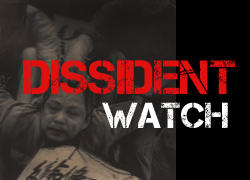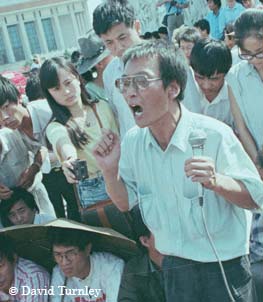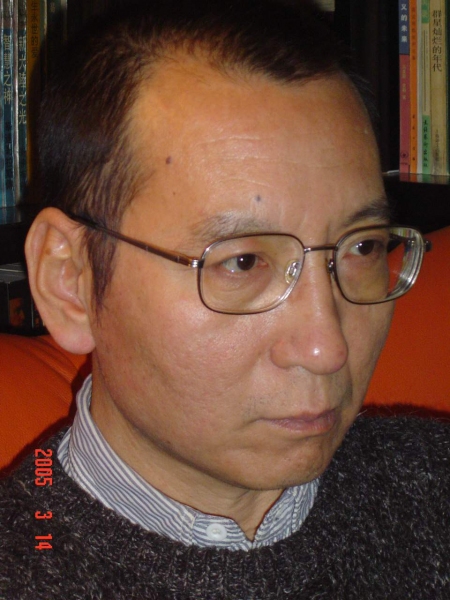Read the whole story here.
Harry Wu, founder of the US-based Laogai Research Foundation, spent 19 years in the laogai system. Wu was sent to a labour camp as a young man in 1960 after police arrested him at his university classroom.
“I just said I disagreed with the Soviet invasion of Hungary,” said Wu, a long-term campaigner for human rights in China, who has written several books on his experiences of the laogai.
Forced to work at laogai farms and a coal mine in the 1960s and 1970s, Wu’s punishments included once having his arm broken by a shovel after guards found books he had buried in a field.
After his release in 1979, Wu left China to join a sister in the US. But in the early 1990s, by then a US citizen, he risked further imprisonment by returning to China to document the laogai and bring them to international attention.
Wu found evidence that several Chinese products of forced labour goods were exported to the West. He has collected scores of testimonies from others imprisoned in the laogai, which he takes to refer to China’s entire penal system, including prisons, detention centres and the laogai (re-education through labour) camps that were also opened in the 1950s.
The prisons and labour camps taken together still form an “instrument of the government to handle the people”, he said.
“We put laogai in the dictionary just like the Soviet gulag.”
China still uses laogai camps, but most laogai facilities were rebranded as prisons after the government officially ended the use of the name in 1994. The Laogai foundation estimates that 40million to 50m people have been imprisoned in the laogai system since the 1950s.
Over the last 30 years, the government has modernised many prisons, improved living conditions, relaxed regulations and dropped much of the old “thought reform” of prisoners, Wu said. “But the function of the prison system – it means force the prisoners to labour and force them to change their mind – is not going to change,” he said. “And the most important thing that hasn’t changed is laogai.” (Read more)
 A Tibetan Buddhist lama, Phurbu Tsering Rinpoche, was sentenced to 8 years in the Laogai on December 23, 2009, on charges of "illegal possession of ammunition and embezzlement." According to his lawyer, Jiang Tianyong, he denies all charges.
A Tibetan Buddhist lama, Phurbu Tsering Rinpoche, was sentenced to 8 years in the Laogai on December 23, 2009, on charges of "illegal possession of ammunition and embezzlement." According to his lawyer, Jiang Tianyong, he denies all charges.  And in this case, "local laws" means the Chinese government's censorship of the
And in this case, "local laws" means the Chinese government's censorship of the  Earlier today China executed a British citizen for the first time in 50 years. Akmal Shaikh, reported to suffer from "
Earlier today China executed a British citizen for the first time in 50 years. Akmal Shaikh, reported to suffer from " 著名持不同政见者、长期的民主活动家刘晓波先生被羁押超过一年,正式逮捕超过半年之后,12月23日中国政府以煽动颠覆国家政权罪对他进行了审判。在长达两个小时的庭审中,外国外交官,包括美国大使馆官员,被禁止旁听,他们聚集在法庭外面等待判决结果。当天的庭审并没有宣布判决结果,中国政府狡黠地等到圣诞节那天才宣布判决结果:刘晓波被处以11年的监禁。尽管中国政府在宣刑时间上费尽心机,判决结果公布后,
著名持不同政见者、长期的民主活动家刘晓波先生被羁押超过一年,正式逮捕超过半年之后,12月23日中国政府以煽动颠覆国家政权罪对他进行了审判。在长达两个小时的庭审中,外国外交官,包括美国大使馆官员,被禁止旁听,他们聚集在法庭外面等待判决结果。当天的庭审并没有宣布判决结果,中国政府狡黠地等到圣诞节那天才宣布判决结果:刘晓波被处以11年的监禁。尽管中国政府在宣刑时间上费尽心机,判决结果公布后, Six weeks ago, Chinese Twitter micro-bloggers made a quite a splash on the anniversary of the fall of the Berlin Wall through the online
Six weeks ago, Chinese Twitter micro-bloggers made a quite a splash on the anniversary of the fall of the Berlin Wall through the online  为纪念中国异议人士刘晓波被中共当局关押一周年,
为纪念中国异议人士刘晓波被中共当局关押一周年,